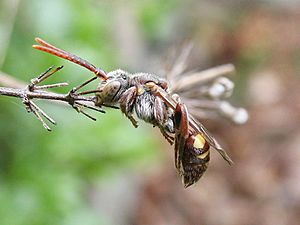Cuckoo bee facts for kids
Cuckoo bees are fascinating insects. They get their name because they act a lot like cuckoo birds. Instead of building their own nests, cuckoo bees lay their eggs in the nests of other bees. This special behavior is called kleptoparasitism. It means they "steal" resources. In this case, they steal the food that the host bee collected for its own babies.
Contents
About Cuckoo Bees
Cuckoo bees look a bit different from other bees. Female cuckoo bees do not have the long, fuzzy hairs that other bees use to collect pollen. This is because they don't need to gather pollen themselves. They also don't build their own nests.
What They Look Like
Many cuckoo bees have less body hair than other bees. They often have a thick outer shell, called an exoskeleton. This thick shell helps protect them. Some cuckoo bees also have strong, saber-like jaws, called mandibles. These jaws can help them get into other bees' nests.
How They Live
Cuckoo bees sneak into the nests of bees that collect pollen. Once inside, the female cuckoo bee lays her eggs in the cells made by the host bee. When a cuckoo bee larva hatches, it quickly eats the ball of pollen that was meant for the host bee's baby. Sometimes, the cuckoo bee larva even kills the host larva.
Social Parasites
In some cases, the female cuckoo bee might stay in the host nest. She might lay many eggs there. Sometimes, she even kills the host queen bee and takes her place. Bees that do this are often called 'social parasites'. Other cuckoo bees are known as 'brood parasites'. This means they lay their eggs in the brood (babies) of another species.
Many Kinds of Cuckoo Bees
There's a whole group of bees called the Nomadinae, or nomad bees. All of them are cuckoo bees. This special way of life has developed many times in different kinds of bees. Scientists have found at least 16 times that bees have evolved to parasitize social bees. They have also found 31 times that bees have evolved to parasitize solitary bees. There are thousands of different cuckoo bee species in the world. They make up a big part of all the different types of bees we know.
See also
- Abeja cuco para niños (Cuckoo bee for kids - in Spanish)
 | Emma Amos |
 | Edward Mitchell Bannister |
 | Larry D. Alexander |
 | Ernie Barnes |


